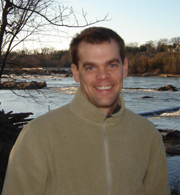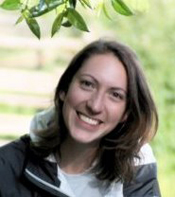2007
- 2009 Duke Fellows
For more information on the Doris Duke Conservation
Fellowships, please return to the Doris Duke
Conservation Fellows Page.
Rebecca Brooke
Joint Business/SNRE, Environmental Policy and Planning
Becca’s interests lie at the intersection of policy, business and land use. Her graduate work examines the connection between bioenergy subsidies, land use change, and wildlife habitat. Prior to her graduate work at The University of Michigan, she worked for the Association of Fish and Wildlife Agencies in Washington D.C., assisting state fish and wildlife agencies in coalition building and advocacy efforts. She has taught coastal ecology to middle school students, studied climate change science and policy responses through the National Science Foundation, and spent last summer working on a commercial services strategy for the National Park Service. In her free time she enjoys hiking, biking, cooking, and travel. Becca holds a BA in Biology and Environmental Studies from Oberlin College.
Erin Carey
Environmental Policy and Planning
Erin’s Master’s research focuses on the impacts of climate change on subsistence livelihoods in rural Alaska. She works with the University of Alaska's Institute of Arctic Biology and the Alaska Department of Fish and Game - Division of Subsistence to document traditional ecological knowledge and develop regulatory mechanisms to reduce vulnerability to climate change. She became interested in climate and the rural poor while serving as a Peace Corps volunteer in West Africa where she worked with farmers to cope with drought and desertification through agro-forestry and economic development programs. Erin was raised on a sailboat in the Pacific Northwest and Central America. As a child, her after-school activities usually involved a snorkel and fins and she had her first lessons in biology by dissecting jellyfish. Erin went on to work as an environmental educator in the Ecuadorian Andes, a SCUBA assistant in Puerto Rico, and a sea kayak guide in Washington’s San Juan Islands. Adventure, environment and people are bound to be recurring themes in her work and life.
Rachel Chadderdon
Joint Public Health/SNRE, Behavior, Education, and Communication
Rachel Chadderdon wants to change the world one tomato at a time. Her studies focus on the implications of the food system for both the environment and for human health. Her internship and volunteer experience relates to influencing people's food choices in order to improve health and promote environmental stewardship. Most recently, she managed a small urban farmers' market, helping low-income customers use state and federal food aid dollars to support small, local, organic farmers. Rachel's past education focused on biology, and between her undergraduate years at Northwestern University and her enrollment in SNRE, she worked as a lab manager and research technician in a neuroscience laboratory in Ponce, Puerto Rico. She grew up in Kalamazoo, Michigan.
Andrew Fotinos
Environmental Policy and Planning
As an undergraduate, Andrew spent summers working for the Tennessee Valley Authority and the Nature Conservancy. He was awarded a Morris K. Udall Scholarship in 2003, and through this program he was introduced to the U.S. Institute for Environmental Conflict Resolution. After studying politics at Washington and Lee University in Lexington, Virginia, he gained experience administering land and water conservation projects with the Nature Conservancy. These experiences led Andrew to pursue a career in habitat, farmland and green-space preservation, areas that he is studying at the School of Natural Resources. Andrew plans to pursue a position managing the conservation program for a landscape, a scale at which he wishes to play a role influencing policy at the local and state level. Specific interests include working on programs to incentivize conservation on private lands and working in high growth rural areas.
Aviva Glaser
Joint Public Health/SNRE, Conservation Biology
Aviva’s Masters' project focuses on the impacts of corn ethanol production on wildlife and wildlife habitat. She has also served as the Communications Manager at the Michigan League of Conservation Voters. During the summer of 2008, she worked at the national consumer advocacy group Food and Water Watch, researching emerging chemical contaminants in water. Previously, Aviva worked for three years in Washington, DC as a Research Associate at Beyond Pesticides/National Coalition Against the Misuse of Pesticides, researching the health and environmental impacts of pesticides and working on issues including asthma and children's health, water contamination, and antibacterial products. She has also had various ecological fieldwork experiences, including a study on the effects of land use on the reproductive habits of native birds in the mid-Atlantic region. Aviva graduated from Oberlin College in 2004 with a B.A. in Biology and Environmental Studies.
Jose Gonzalez
Behavior, Education, and Communication
Prior to attending the School of Natural Resources & Environment at the University of Michigan, Jose Gonzalez worked in public education for six years. In the field of environmental conservation, his interests focus how to foster, support, and evaluate environmentally responsible behaviors. One specific area of interest is researching how underrepresented communities and groups are engaged in environmental conservation. One example is Latino communities and their connection to land preservation and conservation.
Kristen Johnson
Environmental Policy and Planning
Kristen is primarily interested in how land-use decisions associated with urban growth affect wildlife habitat and how to develop policies that mitigate those impacts. In summer 2008 she interned at Greenbelt Alliance, where she researched strategies for land conservation in the San Francisco Bay Area and helped develop a report on the benefits of open space related to water quality, food security, wildlife, and climate change. Kristen’s graduate work investigates the impact of U.S. ethanol policies on land-use changes and habitat. Prior to graduate school, Kristen researched dragonfly predatory behavior and published a paper on tadpole-dragonfly interactions in the journal Copeia. She also worked as an editor for McGraw-Hill Education, developing science and environmental texts for adolescent readers. Kristen holds a B.S. in Biology and English from the University of Michigan.
Bradley Kinder
Environmental Justice
 Brad developed an interest in environmental issues as an undergraduate at Virginia Tech. Upon completion of his undergraduate degree in biology, he joined the U.S. Peace Corps as an environmental education volunteer. From 1999 to 2001, Brad taught Environmental Studies to high school students in Petropavlovsk, Kazakhstan. In collaboration with local community members, he also established a charitable organization designed to assist impoverished individuals through soup kitchens and clothing donation drives. Since returning to the US, Brad has worked with domestic and international environmental non-profit organizations. Most recently, he spent two and a half years at the World Resources Institute’s (WRI) Equity, Poverty, and Environment Project. At WRI, Brad worked with a team of partner organizations in Africa to enhance the role of sustainable environmental management in advancing rural development and poverty alleviation. As a graduate student at the University of Michigan, Brad continues to pursue his interests in the potential of innovative conservation and environmental management mechanisms to generate benefits for rural communities. Specifically, Brad spent the summer as an intern at the Network for Environment and Sustainable Development in Yaounde, Cameroon. As an intern, he worked with a coalition of NGOs to improve the effectiveness of Cameroon’s forest tax revenue distribution system in advancing goals associated with rural development. Brad is also working with the Nature Conservancy in Michigan’s Upper Peninsula to design a conservation action plan for the St. Mary’s River watershed. Brad developed an interest in environmental issues as an undergraduate at Virginia Tech. Upon completion of his undergraduate degree in biology, he joined the U.S. Peace Corps as an environmental education volunteer. From 1999 to 2001, Brad taught Environmental Studies to high school students in Petropavlovsk, Kazakhstan. In collaboration with local community members, he also established a charitable organization designed to assist impoverished individuals through soup kitchens and clothing donation drives. Since returning to the US, Brad has worked with domestic and international environmental non-profit organizations. Most recently, he spent two and a half years at the World Resources Institute’s (WRI) Equity, Poverty, and Environment Project. At WRI, Brad worked with a team of partner organizations in Africa to enhance the role of sustainable environmental management in advancing rural development and poverty alleviation. As a graduate student at the University of Michigan, Brad continues to pursue his interests in the potential of innovative conservation and environmental management mechanisms to generate benefits for rural communities. Specifically, Brad spent the summer as an intern at the Network for Environment and Sustainable Development in Yaounde, Cameroon. As an intern, he worked with a coalition of NGOs to improve the effectiveness of Cameroon’s forest tax revenue distribution system in advancing goals associated with rural development. Brad is also working with the Nature Conservancy in Michigan’s Upper Peninsula to design a conservation action plan for the St. Mary’s River watershed.
Lauren Lesch
Landscape Architecture
Born and raised in the suburbs of Washington, D.C., Lauren Lesch received her B.S. in Plant Sciences from Cornell University in 2005. During her time at Cornell, Lauren pursued her interest in sustainable agriculture and land conservation through internships with the University of Maryland Department of Plant Breeding, and the USDA, and the Casey Trees Endowment Fund. She also completed an independent research project on the ecological and economic health of organic banana farms for the indigenous organization UCANEHU while studying in Costa Rica. Prior to arriving at SNRE, Lauren spent two years as a Teach for America corps member. Placed in the Rio Grande Valley in south Texas, Lauren served as a sixth grade science teacher in a bilingual classroom. During this time, she also co-founded the Student Outdoor Learning and Leadership (SOLL) Center, a non-profit dedicated to improving children’s lives through exercise and outdoor education. During her time at SNRE, Lauren has focused on ecological design and retrofitting urban neighborhoods for biodiversity. She hopes to work in the public sector to improve the ecological health and long-term sustainability of urban lands and watersheds.
Diane Sherman
Joint Law/SNRE, Environmental Policy and Planning
 Diane holds a BS in Environmental Studies and a BA in Political Theory from Michigan State University. Before beginning graduate studies she worked for the U.S. Environmental Protection Agency’s Office of Pesticide Programs and at Resources for the Future. Diane is interested in land use management and land conservation, particularly in connection with agricultural interests, brownfield redevelopment, and socio-economic concerns. During summer 2008, Diane is interning at CLF Ventures, a non-profit affiliate of the New England-based Conservation Law Foundation. Diane holds a BS in Environmental Studies and a BA in Political Theory from Michigan State University. Before beginning graduate studies she worked for the U.S. Environmental Protection Agency’s Office of Pesticide Programs and at Resources for the Future. Diane is interested in land use management and land conservation, particularly in connection with agricultural interests, brownfield redevelopment, and socio-economic concerns. During summer 2008, Diane is interning at CLF Ventures, a non-profit affiliate of the New England-based Conservation Law Foundation.
|



